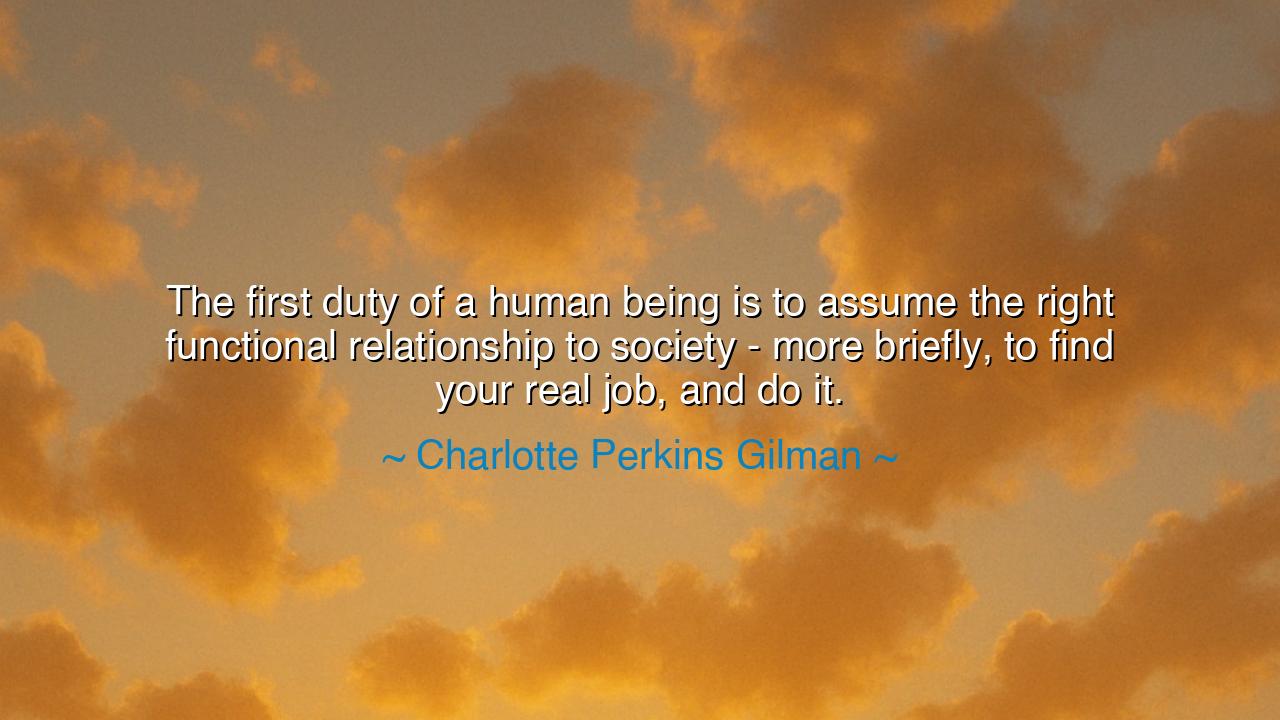
The first duty of a human being is to assume the right functional
The first duty of a human being is to assume the right functional relationship to society - more briefly, to find your real job, and do it.






Hear the voice of Charlotte Perkins Gilman, visionary and reformer, who declared: “The first duty of a human being is to assume the right functional relationship to society—more briefly, to find your real job, and do it.” These words, though simple, strike with the force of timeless wisdom. They remind us that life is not a wandering without purpose, but a call to align one’s gifts with the needs of the world. To live only for oneself is to live small; to discover one’s true function within the greater whole is to live fully, in harmony with destiny and in service to the common good.
Gilman spoke these words not in idle philosophy but out of her own struggles against the narrow roles imposed upon women in her time. She saw how many were trapped in duties that were not their real jobs, but the artificial burdens of a society built on inequality. For her, the call was not simply to labor, but to labor rightly, to claim the work that was truly one’s own, whether in the home, the workshop, the academy, or the halls of power. Thus, her teaching was both universal and radical: each soul must find its true place in the web of life, and when it does, both the individual and the society flourish.
The ancients, too, spoke of this. Plato, in his Republic, taught that justice arises when every person performs the task for which they are best suited—when the farmer farms, the soldier defends, the philosopher rules, and none attempts to live falsely. In this harmony of functions, the city is strong and the soul is at peace. Gilman’s words echo this same principle, yet with a modern cry: that women, long denied the freedom to seek their real jobs, must also claim their rightful relationship to society, lest both themselves and the world be diminished.
Consider the story of Florence Nightingale. Born into privilege, she was expected to live as a social ornament, confined to parlors and tea rooms. Yet she felt a deeper call, a job not imposed by tradition but demanded by her nature: the care of the sick. Against resistance from her family and the conventions of her time, she embraced nursing. In the Crimean War, her work saved thousands, and in her reforms she reshaped medicine itself. Here we see Gilman’s words alive: Nightingale found her real job, assumed her rightful relationship to society, and in doing so, transformed the world.
But the danger, Gilman warns, lies in ignoring this duty. Many live lives of pretense, doing work that does not fit their spirit, or remaining idle when they might serve. In such misalignment, both the person and the society suffer. The individual feels restless, empty, or broken, while the community is deprived of the gifts that might have been. Just as a wheel out of place weakens the whole chariot, so too does one soul out of its proper work weaken the fabric of humanity.
The lesson is profound: your duty is not simply to work, but to discover what work is truly yours. This requires courage—to defy the voices that tell you who you must be, to resist the temptations of ease, and to listen to the inner call of your gifts. It requires humility—to recognize that your work is not for yourself alone, but for the greater society that depends on each member’s faithfulness. And it requires perseverance—to do your job with diligence, not once, but always, for the good of all.
What, then, must you do? Seek your real work, not merely what pays, but what fits your soul and serves your community. Do not fear if it is humble, for the smallest function rightly fulfilled is greater than the grandest pretense. Honor others in their own rightful callings, for each role is sacred. And above all, remember that your relationship to society is not optional but essential—by fulfilling your part, you help sustain the whole.
Thus remember: the measure of a life is not in wealth or fame, but in faithfulness to one’s real job. This is the first duty of every human being. When each finds and fulfills it, society becomes strong, harmonious, and just. And when we fail, both we and the world lose our way. Let Gilman’s words guide you: seek your true place, live your true calling, and by doing so, weave your thread into the eternal fabric of humanity.






AAdministratorAdministrator
Welcome, honored guests. Please leave a comment, we will respond soon